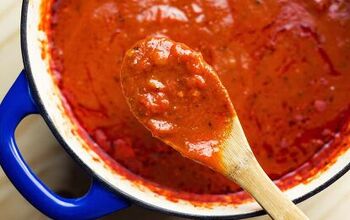How Long Is Spaghetti Sauce Good For In The Fridge?

Who doesn’t like a good plate of pasta or spaghetti? This culinary classic is not only delicious but super easy to prepare. On top of that, it is an inexpensive meal to boot. For those reasons and more, you would be hard-pressed to find a home that hasn’t enjoyed this Italian delight at some point.
But what about when it has been sitting in the fridge for more than a few days? When it comes to the sauce, in particular, you need to be certain. How long can you reasonably expect to enjoy some of that leftover deliciousness? There is no exact time frame, but you can generally expect it to keep somewhere between 5 and 10 days. Anything more than 10 days after eating, you should just toss the leftovers and start fresh.
Spaghetti Sauce in the Fridge: How Long Do You Have?
For most tomato-based sauces, you are looking at somewhere in the 5-10 day range. A week is probably the more realistic cap on those leftover items if you want to be really safe about it, though. The longer it sits, the worse off it will be.
Meat-inclusive sauces
If the sauce in question has meat mixed into the tomato sauce, the story is different. Sauce that has meat in it should go no longer than 3-4 days in the fridge. That includes meat sauces, spicy Italian sauces, chili or red clam sauces.
Meat tends to spoil at a more accelerated rate than pasta sauce on its own in the fridge. Be aware of this if you make larger batches or consider freezing leftovers if there are enough to justify it.
Cream-based sauces
When it comes to sauces that have a cream base, a week is standard. The reason for the slightly longer period than even some tomato sauces is that some of the ingredients do better in the fridge. Your cream-based sauces would include alfredo, white clam, and any kind of beer cheese sauce.
What is the Best Way to Store Leftover Spaghetti Sauce?
If you plan on eating your leftovers within the next couple of days, storage is simple. Just put it in a covered container and get back to it within a few days. It is when you plan to go a little longer than that where things get dicey.
In the fridge
If you are adamant about keeping your leftover pasta or spaghetti in the fridge, the container is of the utmost importance. Go with something that has an airtight seal. A Ziploc bag works just fine. Even then, you really should not go more than a day or two past the recommended shelf life. The fridge is typically not meant for long-term storage for items that have already been prepared.
In the freezer
The freezer is the best option for storage any longer than a week. Of course, if you have just enough to make one more dish, it may not seem worthwhile. The freezer is typically better for larger batches as it is a long-term storage option. You can keep pasta in the freezer for months at a time before bringing it out and reheating it.
The best bet
Unless you are making a larger batch of spaghetti or pasta, the fridge is the most convenient option. Make it a priority to get to your leftovers within a few days. If you don’t think that’s manageable, simply toss the leftovers and save yourself the disgusting revelation later on.
How Do You Tell if Spaghetti Sauce is Bad, Spoiled, or Rotten
So, what do you do if that week timeline has passed and you have forgotten about the spaghetti or pasta? It is not out of the realm of possibility to forget that you have put the leftovers in there to begin with.
When it comes time to crack open the lid, not all of us may remember how long the spaghetti sauce has been there. Instead of guessing, there are a few telltale signs that you are dealing with a spoiled, nasty batch of sauce.
Color. When spaghetti sauce goes bad, it typically will darken at least a little bit. Instead of the bright red color it is known for, you would see something closer resembling maroon. If your spaghetti sauce is dark, give it a toss.
Thickness. Another telltale sign that your spaghetti sauce has gone bad is the thickness. When it is fresh (or close to), spaghetti sauce is loose and light, maybe even a little watery. But when it has time to set and rest in the fridge, it thickens up. Just how thick depends on the sauce that you use and how long it has been there.
Mold. In the most extreme cases, you can tell that your spaghetti sauce has gone bad due to mold. When you are dealing with mold, toss the entire container. Mold has several health risks associated with it and should not be messed with. Toss the container as the mold spores can hang on even after it has been cleaned.
Related Questions
What Happens If I Eat Expired Spaghetti Sauce?
Perhaps the most important question is whether or not you can get sick from eating expired spaghetti sauce. The real answer is that it depends on the condition of the spaghetti sauce when you get to it. There are more than a few variables at play.You will be fine. Generally speaking, so long as you don’t notice visible mold growth, you are fine. If there is no real noticeable taste difference or strong odor, then there was no major bacterial growth involved. The bacteria is what makes bad spaghetti sauce dangerous to eat.Tomatoes are quite acidic, which prevents mold and bacteria growth. Not to mention the higher salt content of tomato sauce helps to keep bacteria growth at bay as well. Hell, you can leave ketchup out for weeks at a time with no real issue.The worst issue you will likely face is texture or a slight taste difference. No harm, no foul there and you will live to fight another day.Mixed with other food. Most of us eat spaghetti sauce with some form of pasta. The good news is that, even if you eat old spaghetti sauce, it is somewhat diluted by the pasta. That can be helpful in the event that there was some bacterial growth.Mold growth. If you ate sauce that had mold or bacterial growth on it, then you may be in trouble. Bouts of nausea, vomiting, or diarrhea will typically follow. Should you experience any of those symptoms, get to a healthcare provider as soon as you can. If you get there early enough, they should be able to treat you.
Can You Get Food Poisoning from Spaghetti Sauce?
We have all known someone that gets the dreaded food poisoning. They eat a seemingly innocuous meal and then, suddenly, they are violently sick. It is a horror story that most of us have been able to avoid.So, what happens if you eat a plate of spaghetti that has been sitting in the fridge for a while? Can you get food poisoning if the spaghetti sauce has gone bad?The good news is that you likely won’t. For the most part, it takes a really, really long time for spaghetti sauce to develop mold or any other bacteria that can be potentially harmful. Even then, it is more common in sauces that have meat than those that don’t.Gastroenteritis typically happens when there is an infectious organism within. That organism then infects your intestines and the lining of your stomach, causing them to inflame. That is what leads to the nauseous feeling and the constant vomiting.For the most part, pasta sauce in general will simply not be good if it sits too long. Past that, you rarely have to worry about serious side effects from “old” spaghetti sauce. That said, it is also not impossible, either. Use caution.
Why Do I Get Heartburn After Eating Spaghetti Sauce?
Heartburn may not seem like a big deal, but it can be quite a discomfort to live with. Perhaps you have noticed that, after you eat a heavy sauce that is tomato-based, you feel the impacts of heartburn boiling up in your chest.Gastric Acid. There is gastric acid within our stomachs. This acid is what breaks down the food that we consume when it hits our stomachs. Tomatoes are also high in acidity. For some, that combination can create too much gastric acid when the tomato-based food hits the stomach.That gastric acid then backs up into the esophagus. That burning sensation that you may be experiencing is the result of that backlog of gastric acid. It isn’t a huge deal, but it is a major discomfort for some and should be avoided when possible.
More Related Guides

Ryan Womeldorf has more than a decade of experience writing. He loves to blog about construction, plumbing, and other home topics. Ryan also loves hockey and a lifelong Buffalo sports fan.
More by Ryan Womeldorf



























